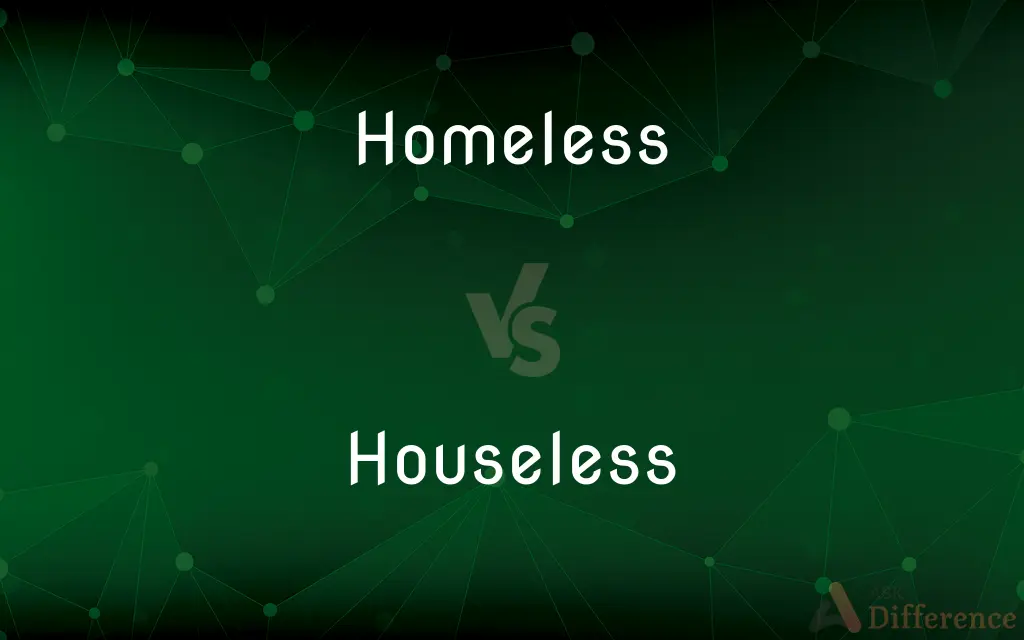Homeless vs. Houseless — What's the Difference?
Edited by Tayyaba Rehman — By Maham Liaqat — Updated on March 19, 2024
Homeless refers to lacking a stable, permanent residence, while houseless specifically denotes lacking a physical house but may have temporary shelter.

Difference Between Homeless and Houseless
Table of Contents
ADVERTISEMENT
Key Differences
Being homeless encompasses a broad range of situations, including individuals who lack a stable and permanent place to live. This can mean sleeping on the streets, in shelters, or in places not meant for habitation. On the other hand, being houseless often refers to people who, though they do not own or rent a traditional house, may have some form of shelter, such as living in a vehicle, tent, or transitional housing.
The term homeless is widely used in societal and policy contexts to describe individuals or families without a fixed, adequate, and regular nighttime residence. Whereas, houseless is a term sometimes preferred by those who have temporary living arrangements but do not identify with the vulnerability or instability often associated with homelessness.
Policies and support services for the homeless aim to address a range of needs including shelter, food, healthcare, and job training. For those who are houseless, the focus might be on securing stable, long-term housing, reflecting the different challenges faced by this group compared to those who are more broadly homeless.
The causes of homelessness and houselessness can overlap, including financial hardship, job loss, lack of affordable housing, and personal crises. However, the solutions and interventions may differ, with houselessness often requiring specific strategies to transition individuals to permanent housing.
Public perception and societal responses to homelessness and houselessness can vary. Homelessness is often seen as a critical social issue requiring broad community and governmental action. Meanwhile, the concept of houselessness highlights the diversity within the experiences of people without permanent homes, suggesting a need for tailored approaches to support and assistance.
ADVERTISEMENT
Comparison Chart
Definition
Lack of a stable, permanent residence.
Lack of a physical house, may have temporary shelter.
Scope
Broad, includes various unstable living situations.
Specific, implies some form of temporary shelter.
Policy Focus
Addressing a range of needs for stability.
Securing stable, long-term housing.
Causes
Financial hardship, lack of affordable housing, personal crises.
Similar to homeless but with potential for temporary solutions.
Societal Response
Broad community and governmental action.
Tailored approaches to support and assistance.
Compare with Definitions
Homeless
Wide range of unstable living situations.
Homeless people might sleep on the streets, in cars, or in parks.
Houseless
Lacks a traditional house but may have shelter.
The houseless family lived in their RV while searching for affordable housing.
Homeless
Needs include shelter, food, and healthcare.
Homeless services provide meals, medical care, and assistance finding housing.
Houseless
May live in vehicles, tents, or transitional housing.
Many houseless individuals find temporary refuge in campgrounds or hostels.
Homeless
Subject of broad societal support.
Charities and governments work to offer aid to homeless populations.
Houseless
Calls for tailored support and assistance.
Assistance for the houseless includes helping them transition to stable homes.
Homeless
Affected by various factors.
Loss of employment can lead to homelessness.
Houseless
Shares causes with homelessness but may have different needs.
Houseless people might need access to resources for maintaining their temporary living situations.
Homeless
Lack of permanent residence.
The homeless individual slept in different shelters each night.
Houseless
Focus on securing permanent housing.
Programs for the houseless often aim to provide long-term housing solutions.
Homeless
(of a person) without a home, and therefore typically living on the streets
Charities for the homeless
The plight of young homeless people
Houseless
Lacking or in need of a house or home
"He said that he was houseless but not homeless because he went to school in that community, was registered to vote there, and had been living in the teepee for seventeen years. He said that teepee was his home."
Homeless
Having no home or haven.
Houseless
Homeless but not wanting for local ties, affiliations or roots in a particular community.
Homeless
People without homes considered as a group. Often used with the.
Houseless
Destitute of the shelter of a house; shelterless; homeless; as, a houseless wanderer.
Homeless
Lacking a permanent place of residence.
Whenever I pass the park, I see the homeless people sleeping on the benches.
Homeless
Destitute of a home.
Homeless
Those people who have no permanent residence, especially those who live outdoors due to poverty; usually used in the definite phrase the homeless.
Homeless
Someone with no housing;
The homeless became a problem in the large cities
Homeless
People who are homeless;
The homeless lived on the city streets
Homeless
Without nationality or citizenship;
Stateless persons
Homeless
Physically or spiritually homeless or deprived of security;
Made a living out of shepherding dispossed people from one country to another
Common Curiosities
What is the main difference between being homeless and houseless?
Homeless encompasses a lack of stable, permanent residence, while houseless refers to lacking a traditional house but may include temporary forms of shelter.
What kind of support might a houseless person need?
They may need resources to maintain their temporary shelter and assistance in securing long-term, stable housing.
What are common causes of homelessness and houselessness?
Both can result from financial hardship, lack of affordable housing, job loss, and personal crises.
How do societal responses to homelessness and houselessness differ?
Homelessness is often addressed through broad community and governmental action, while houselessness may require more tailored support to transition to permanent housing.
What role do charities play in supporting homeless and houseless individuals?
Charities offer a range of services from emergency aid to programs designed to secure stable housing.
Can someone be houseless but not homeless?
Yes, someone can be houseless if they have a temporary form of shelter but do not have a permanent home.
How do policies aim to assist homeless individuals?
Policies may provide emergency shelter, food, healthcare, job training, and help in finding permanent housing.
What misconceptions exist about homeless and houseless people?
Misconceptions include stereotypes about their reasons for being in their situation, ignoring the complex social and economic factors involved.
What impact does homelessness have on communities?
Homelessness can strain community resources but also inspires communal efforts to provide aid and solutions.
How can society better address the needs of homeless and houseless individuals?
By providing comprehensive support services tailored to the diverse needs of those without stable housing.
What is the significance of distinguishing between homeless and houseless?
The distinction helps in understanding and addressing the specific needs and circumstances of different groups within the wider issue of housing instability.
How does being houseless affect an individual's daily life?
Being houseless can involve challenges like securing safe, temporary shelter while managing health, employment, and the pursuit of permanent housing.
Is the term houseless recognized in policy and social services?
While less commonly used than homeless, the term houseless is gaining recognition for highlighting specific needs and experiences.
Can improving affordable housing reduce homelessness and houselessness?
Yes, increasing access to affordable housing is a key strategy in reducing both homelessness and houselessness.
Are there successful models for transitioning houseless people to permanent housing?
Yes, programs like Housing First focus on providing stable housing as a foundation for addressing other needs.
Share Your Discovery

Previous Comparison
Helloween vs. Halloween
Next Comparison
Buy vs. EarnAuthor Spotlight
Written by
Maham LiaqatEdited by
Tayyaba RehmanTayyaba Rehman is a distinguished writer, currently serving as a primary contributor to askdifference.com. As a researcher in semantics and etymology, Tayyaba's passion for the complexity of languages and their distinctions has found a perfect home on the platform. Tayyaba delves into the intricacies of language, distinguishing between commonly confused words and phrases, thereby providing clarity for readers worldwide.














































